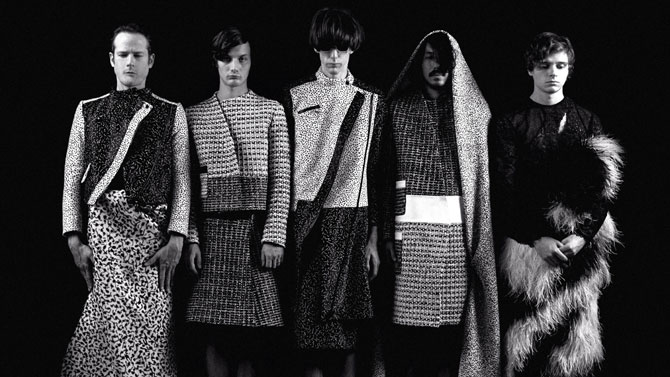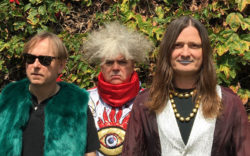“The phone rang/ It was 3 a.m.,” sings Bradford Cox on “T.H.M.” The song appears midway through Monomania, the latest Deerhunter record, released earlier this year. It’s a deceptively simple track: two complementary guitar lines split into the right and left stereo channels, a grounded bassline leaps up every fourth beat. Cox gets to those lines a few measures into an extended phrase. The band slowly picks up momentum, a ride cymbal introduced into the subtly propulsive four-on-the-floor drumbeat just as Cox cagily identifies the caller: “It was T.H.M.”
Part of the story behind Monomania began with a different phone call. Late one Sunday night in 2012, Athens musician Josh McKay (Abandon the Earth Mission, Macha, Space Trucks) was up late working in the studio.
“I was up at Chase Park mixing Abandon the Earth Mission, the record I’d been working on last year,” he relates. The atmosphere was hectic. “Everything [was] bottlenecking,” he says, describing a “gotta-wrap-it-up kind of vibe… But my phone happened to be sitting out and I saw that it was Bradford calling.” When McKay picked up, a question came from the other line: “Josh, can you be in Atlanta in 40 minutes to try out for Deerhunter?”
The invitation didn’t come entirely out of thin air; McKay describes “a really inspired, multi-hour jam session” at Cox’s house a few months prior. McKay initially talked Cox down—“Oh my God, you couldn’t have picked a worse time to ask me this”—but got another call the next day, and within weeks he was with the band in New York working on its new record.
McKay describes the circumstances in which he joined Deerhunter as typical of the group. “[It was] really fast and furious, which is pretty much the way Deerhunter likes to work. Minimum preparation, maximum chaos.”
It’s not entirely surprising that one of the unique bands to emerge in the last decade should have such a volatile dynamic. The arc of the group’s career, from its 2006 breakthrough, Cryptograms, to this year’s Monomania, has encompassed a staggering array of different styles. Cryptograms combined the band’s taste for lush, drawn-out atmospherics with the straightforward garage-rock gaining notice in Atlanta at the time, with bands like the Black Lips and the Coathangers receiving national attention. The follow-up, Microcastle, saw the band perfecting this sound, bringing these two poles together in a more cohesive way, while 2010’s Halcyon Digest brought a shift to more condensed songwriting.
Throughout, Deerhunter has managed to incorporate variety into its sound while still preserving its own particular character. This is due in large part to frontman Cox himself, who is as compelling and charismatic a bandleader as any in rock history. Whatever Pitchfork-fueled controversial aura there is surrounding Cox only serves as further proof of what a magnetic presence he is, both onstage and on record. His outsize persona revolves in large part around how forthcoming he has been about his insecurities, and yet with each new record he becomes more brash and defiant. The contradiction seems distinctly contemporary. In the age of Ativan and Internet oversharing, he is our twisted Mick Jagger.
To focus too much on Cox’s personality, however, would be to lose sight of Deerhunter’s unique position on the current musical landscape. Other big-ticket indie acts either have self-consciously embraced nostalgia—think Arcade Fire—or, as with LCD Soundsystem and Animal Collective, have moved further afield, towards music outside of what might be considered the “rock” realm.
Deerhunter, on the other hand, has managed to fold in disparate strands of music, from electronics to Americana, without ever seeming like a throwback act or departing from its core guitar-bass-and-drums sound. Cox can slick his hair back, 1950s-style, and pose with an old-fashioned mic, as he does for the cover of his latest solo album as Atlas Sound, and he can don a Joey Ramone wig for an appearance on “Late Night with Jimmy Fallon”: these gestures are both indicative of Deerhunter’s ties to the arc of rock music in the last six decades and somehow also proof that the band is doing something that is entirely of the moment.
Monomania captures this aspect of the band more than any of its previous records. Each song seems to draw from a different influence. The twangy guitars on “Pensacola” combine with lyrics that invoke a road trip. It’s a version of the U.S. distilled into abstractions—“the delta,” “the plains,” “the bay”—all expanding on the vulnerable first line: “Take me on the trip, man/ I’ll never get sick.” The track comes right after guitarist and co-songwriter Lockett Pundt’s “The Missing,” which has a clean, melodic guitar line that wouldn’t sound out of place on an early record by the Strokes. “Nitebike” seems at first like a simple, solo acoustic plaint, but the exaggerated echo effect on Cox’s voice adds an off-kilter touch that serves to make the song more affecting.
Recalling the recording process for Monomania, McKay describes an intense experience: “Every night going to the studio around 7 p.m., and returning in the morning around 7 a.m.… I didn’t see the sun for the entire time, pretty much.” His account of playing with the group suggests an experience as sui generis as Deerhunter’s music. McKay is no stranger to large-scale touring, but still describes playing with Deerhunter as being “entirely, completely different. There’s a chaos factor that I’ve never encountered before.”
That chaos might be central to what makes the band so dynamic. “It’s hard to explain it,” McKay says. “I just see it as a cathartic energy resulting from this kind of chaos. The show ends up having to shake all this static in the air out.” This unknown factor gives Deerhunter its vibrant edge. “We don’t end up settling on some sort of pat technique for being a rock band.”
WHO: Deerhunter, Elf Power
WHERE: 40 Watt Club
WHEN: Saturday, Nov. 16, 9 p.m.
HOW MUCH: $16
Like what you just read? Support Flagpole by making a donation today. Every dollar you give helps fund our ongoing mission to provide Athens with quality, independent journalism.










